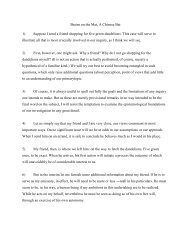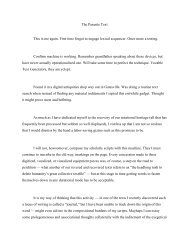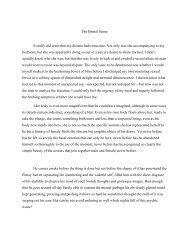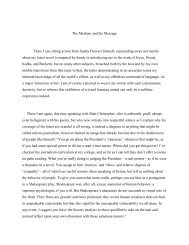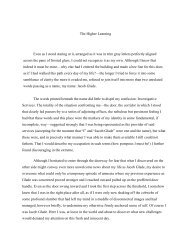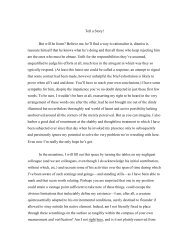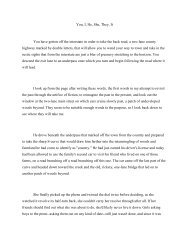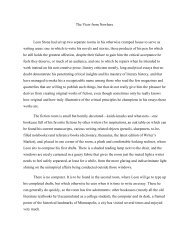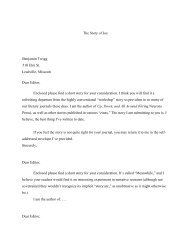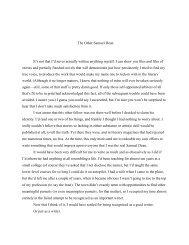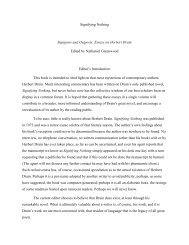Simplicity
You also want an ePaper? Increase the reach of your titles
YUMPU automatically turns print PDFs into web optimized ePapers that Google loves.
<strong>Simplicity</strong><br />
Many are the moments I recall from that quiet, unhurried life. As well the people,<br />
simple but also shrewd about the ways of the world. Or at least of that less sophisticated<br />
world they had been born to. As, of course, had I.<br />
It ought, then, be a simple matter to choose one such moment to relate here. After<br />
all, in a world like that which I remember, almost any experience selected is likely to<br />
seem right. Representative of the whole. And, given the limited range of types available,<br />
practically anyone among the “characters” one might pick out would do in a pinch.<br />
And yet I hesitate to settle on that single event or that particular individual I<br />
unavoidably need to begin my story. One must begin somewhere, this I know, and I am<br />
still confident that the story I have to tell, although necessarily simple, remains<br />
fundamentally worthwhile. It is, as I believe you will see, a story of manifest human<br />
significance and direct emotional authority.<br />
In many ways I suffer from an embarrassment of riches. Perhaps it is just that I am<br />
inclined to look back on my own past life in the very world I wish to evoke through<br />
decidedly rose colored glasses. Perhaps everyone tends to idealize the time spent in the<br />
seemingly less complicated world of one’s younger days. Nevertheless, so many scenes<br />
from those days remain etched in my memory that I feel in some measure helpless to<br />
isolate just that one most telling of such scenes and render it here in all its vivid hues and<br />
still-sharp relief.<br />
Thus I will simply designate an episode at random and from there commence my<br />
tale. I will tell it in a manner as simple as the circumstances from which it arises and the<br />
people with whom it is concerned. One factor does complicate somewhat the nature and<br />
the difficulty of my task. I myself was present on this occasion but of course I will not<br />
refer to myself by name. This story is not about me at all, and so I will appear as just<br />
another character among those assembled. Such a device will, I’m afraid, be necessary if
2<br />
I am to get on with my task of depicting these events in the modest and disinterested<br />
manner they require.<br />
This will require as well that I cease speaking from the subjective point of view I<br />
have been using up to this moment. I will need to switch instead to the indirect mode of<br />
narration according to which I remove myself to an equal distance from all the characters<br />
and their exploits.<br />
Although I will do my best in this endeavor, I am not altogether comfortable in the<br />
role. I am much more at ease speaking in my own voice, as it were, and I employ this<br />
other method only with great reluctance. I am convinced, however, that by adhering to<br />
this method I will be able to maintain the simplicity of means I believe to be crucial in<br />
accomplishing my goals in this instance.<br />
I will admit to having second thoughts about both of these decisions. While it is<br />
certainly customary for the author to disguise his presence in the story he is telling by<br />
assuming a place in the cast of characters, is it absolutely necessary that I pretend not to<br />
be the personage I obviously am? Similarly, must I give up my preferred vantage point<br />
merely to avoid the impression I know more than I should?<br />
This is all more than you need to know, I am sure. On the other hand, there is<br />
something to be said for being honest about the kind of outright deception you are asking<br />
others to accept. The ambitions one hopes to fulfill might be simple, but does that mean<br />
achieving them will be easy, without strategy or forethought?<br />
None the less, I shall proceed as I must. The most important thing is that this<br />
chronicle keep moving forward, its narrative momentum remain unimpeded by needless<br />
equivocation. No daylight should appear between the succession of events related and the<br />
will to relate them in a forthright and unadorned way.<br />
Now that I think of it, this would be a good description of the people who serve as<br />
the subject of my story—as you will see when I am at last in the midst of recounting it.<br />
They are plain and unadorned people living a plain and unadorned kind of life in an<br />
especially plain and unadorned part of the country. I don’t want to give away too much of<br />
the message I wish to convey about these people and their way of life, but since I have<br />
already represented them to you in these words I can only acknowledge that this is the
3<br />
conclusion—that they are plain and unadorned people, etc.—I hope you will reach<br />
concerning the characters and the incidents depicted in what follows.<br />
Actually, it should be fairly simple to create this impression of my characters and<br />
their activities. They are, in point of fact, both plain and unadorned, and thus merely to<br />
write of them as they presented themselves to me would be to tell the truth about them—<br />
that they are. Etc. Would it not?<br />
I am afraid I will have to pause here and ask you to please overlook these<br />
occasional lapses in decorum whereby I am led to address you, my reader, directly. As in<br />
the question just posed. Also, of course, in the very request I am now making. A certain<br />
number of purely rhetorical flourishes such as this are sometimes tolerated, but I am<br />
conscious of having crossed a line whose integrity simply must be respected. My story<br />
will lose all credibility if I continue in this vein, although I won’t go back and delete<br />
those examples of my transgression already committed. Such a move would only detract<br />
from the air of spontaneity that should be created in a properly fashioned work like the<br />
one I aspire to here.<br />
But then I should not be speaking of “fashioning” this story at all. This would<br />
imply that I am making the whole thing up, concocting it out of whole cloth, and nothing<br />
could be further from the truth. Every word in this account is—or will be—taken directly<br />
from real life. Every experience herein adduced is a verifiable record of an occurrence<br />
that actually happened—if not to me, then certainly to those whose lives form the basis of<br />
my interest in composing this piece in the first place. Although again “composing”<br />
suggests a degree of artifice that most assuredly plays no part in my deliberations. I am<br />
dedicated to bearing witness in these pages to the simple, honest, unvarnished truth.<br />
These prefatory remarks, though more diffuse than I had anticipated when I<br />
initiated them, have finally prepared us for the introduction of our inaugural scene and the<br />
subsequent exposition of its concrete particulars. From there we will begin to report the<br />
rising action that naturally flows from these particulars—if “action” is what we will<br />
ultimately want to call it—and eventually arrive at the apex of our dramatic arc, where<br />
the conflicts our story encompasses, as modest as they are, will come to a resolution of<br />
sorts and the story will proceed through a brief but instructive denouement.
4<br />
The story will unfold in this way because such a scheme is so obviously faithful to<br />
the way the flow of our own lives takes place. It is a powerful but simple model of the<br />
inherent forces that direct and inform our understanding of the meaning the ongoing<br />
course of events inevitably reveals.<br />
This was, at least, the theory with which I began my current labors. The nearer I<br />
come to that moment when I must actually set my story out on its own path the more<br />
doubts I find myself having about the soundness of that last statement. Reading it over,<br />
I’m not really sure I know what it means. Yet I have an intuitive sense that some such<br />
formulation of the interrelatedness of events must be right. To think otherwise would be<br />
to succumb to the notion that what happens to us is random, subject to no higher analysis<br />
or conceptual scheme. Myself, I do not want to believe that.<br />
Yet, I would do well to remember my overriding conviction: that this story and its<br />
subjects are simple, and all the more meaningful for being so. No “conceptual scheme” is<br />
required to bolster its authority. A story is a story. Its authority is sufficient unto the day.<br />
That statement is pretty obscure too. What I mean to say is a story such as this<br />
one—any story that seeks to humbly represent life as it is, the irreducibly real—does not<br />
need to be justified by some abstract, philosophical proposition claiming to invest it with<br />
significance. The trick, it would appear, is to balance our sense that life has order,<br />
purpose, at least equal parts of joy and sorrow, with the need to convey one’s chronicles<br />
of life as it is lived according to the high ideals and principles of artistic creation. One<br />
must not overshadow or distort the other. The best solution, of course, would be to meld<br />
the two imperatives together, seamlessly, so that one seems the natural complement of the<br />
other.<br />
We are now again ready to launch our tale, which ought surely to be only<br />
strengthened by the reflections with which I have so far freely indulged myself. My<br />
resolution should be fortified, my goals thoroughly illuminated, freshened. But frankly I<br />
find myself approaching this long-deferred duty with some newly realized reservations,<br />
even outright dread. What if I am no longer up to it? What if it all goes wrong? (These are<br />
questions I am addressing to myself, for the record. I remain mindful of my previous<br />
admonitions to avoid the tactless gesture.) The moral at this point would seem to be that
5<br />
overmuch meditation on the finer details of telling one’s story gets one nowhere—except<br />
to additional meditation. Better to get on with the thing, ready or not.<br />
Such a spirit happens to be entirely characteristic of the putative subjects of the<br />
story I had in mind. (Once more I have managed to catch on the run, so to speak, just the<br />
hinge I need to turn this work onto a more productive track.) They are nothing if not<br />
efficient, practical-minded, resourceful, determined, resilient, adept, spontaneous, selfpossessed,<br />
hardy, fearless, alert, capable, decisive, stalwart, forthright, responsible,<br />
courageous, purposeful, and authentic.<br />
The list could go on.<br />
And I am now more hesitant than ever. How will I manage to string together a<br />
series of simple actions, mere anecdotes most likely, that will illustrate these traits in any<br />
remotely convincing way? On the other hand, since I’ve already revealed what I intend to<br />
communicate about my characters and their milieu, perhaps coming up with a narrative in<br />
order to highlight these features—to deliver the message, but discreetly—is now<br />
unnecessary, even counterproductive because redundant. Couldn’t it be taken as an<br />
imposition on the reader’s attention? A needless frill?<br />
If the folks in D_____ (a partial cognomen for now, but I hope to provide the<br />
name in full once my confidence is up) can be counted on to know anything when they<br />
see it, it would be a needless frill. It is, in fact, a central tenet of their creed to dispense<br />
with all such frills. Therefore, it would be incongruous without question if I were here to<br />
foist on them and their no-nonsense way of life a “plot” of uncertain merit and dubious<br />
veracity. (To say the least.)<br />
Thus, the story I am about to tell almost doesn’t qualify as a “story” at all. It has<br />
sequence, continuity, interconnection, but only so much as to make possible the<br />
emergence of persona and activity in a minimally perceptible form. In this manner, it will<br />
do justice to the fundamental, artless simplicity of the lives that have inspired the telling.<br />
The natural, fecund, intricate simplicity bred into the very marrow, woven into the very<br />
fabric, stamped upon the very matter of the life whence this “story” derives its<br />
provenience.
6<br />
Well, the subject might be simple, and the design elementary, but the wording<br />
certainly isn’t. What a blast of hot air! It’s never come on me like that before. My prose<br />
style has always been a model of cogency, precision, and, yes, simplicity. A typical first<br />
sentence would normally be something like this: “The rain fell.” Can you be more direct,<br />
less unpretentious than that? No ostentation in that sentence. All pith and sinew.<br />
Where did it go? Where in the honest attempt to relate my story in the simple<br />
manner I was certain it required and that I have in the past so obviously mastered did my<br />
grasp on this eminently practical, time-tested technique start to loosen? Why did I<br />
suddenly veer in this other direction, give over to such verbosity, and toward no<br />
fathomable objective? How did something intended to be so concise, so tightly organized<br />
and straightforward, become so fuzzy and loose-jointed?<br />
I’m giving up on the idea I should not speak to my reader directly. Of course I<br />
don’t expect him or her to respond in kind to my words—I may be confused, but I’m not<br />
insane—but at this stage there seems no point in pretending that, even if this story finally<br />
does get off the ground, I am an “invisible” narrator simply providing the facts and<br />
reporting on what otherwise objectively happened apart from my knowledge about it.<br />
Even I always understood that that one was simply an outright fraud.<br />
So I will now further admit that the story I was planning to tell you—that I still<br />
intend to get to, although you certainly have every right to be skeptical—was itself a<br />
fraud: it was indeed all made up. In no way does that mean it wasn’t worth telling<br />
anyway, even that it didn’t contain its own germs of truth. But the “simple” people I was<br />
going to tell you about—will tell you about, very soon—are all figments of my<br />
imagination. At the same time, they were certainly modeled on people I actually did<br />
know. And for that matter the circumstances in which they (and I) lived were certainly<br />
simple. Perhaps, then, the pretense behind the utter fiction I was prepared to advance was<br />
in these small ways a defensible deception.<br />
But then you knew it was a fiction as well, didn’t you? In addition to almost<br />
believing myself that the illusion I was going to attempt to create was not an illusion at<br />
all, I apparently also convinced myself that you couldn’t see through the charade either.<br />
Although you might have been willing to go along with the game if the potential reward
7<br />
loomed large enough, you knew perfectly well that behind every supposedly simple story<br />
lurked countless complexities and that what seems a true-to-life account is really a<br />
complete invention. Isn’t this true?<br />
That’s not a challenge, simply a comment. Mostly on my own credulity. Here I<br />
was thinking that I had to figure out all the smart moves to use —consistent with<br />
simplicity—in order to convince myself I’d fooled all of you when in fact it was you all<br />
along fooling me: you pretend not to notice my stratagems but are perfectly aware of<br />
them, have in fact seen them all before. But then I knew this too, even though I tried to<br />
block it out. Otherwise, who could ever presume to offer up yet another story without the<br />
fear of ridicule, or something worse?<br />
All of which makes me not merely uncertain about going ahead with that story<br />
I’ve been promising, but downright apprehensive, almost to the point that I’ve just about<br />
decided to call the whole thing off. As far as I can tell I’m in a no-win situation. If I go<br />
ahead with the sort of thing I had in mind in the first place, you won’t be able to receive it<br />
with anything like the assumed innocence I would need. I’ve given away far too much.<br />
It’s conceivable I could simply start again and just stick to the essentials, dispensing with<br />
all the palaver. But my ability to do this without backtracking through the rhetorical brush<br />
has, I fear, been severely compromised. On the other hand, if I resolve to push on ahead<br />
regardless of the obstacles I’ve set up in my own path you’re going to be more interested<br />
in how I manage to negotiate those obstacles than in what I’m trying to tell you.<br />
But what is it I’m trying to tell you? That my characters are simple? That the lives<br />
they lead are simple as well? That the story I came to tell is equally simple, as are (will<br />
be, would be) the means employed to tell it? I’ve already told you all of that. I’ve just told<br />
it to you again. Does knowing these things beforehand make you better prepared to<br />
appreciate the story once it is under way, or simply inclined to disregard the story<br />
altogether, to, as they say, let it slide?<br />
There’s probably nothing for it except to plunge forward once and for all and see<br />
what happens. All reservations and hesitations and qualifications over the side. Afloat at<br />
last!
8<br />
On a bright spring afternoon in D_____ the city park was fast filling up with<br />
young families hoping to take advantage of the first warm day of the season after a long<br />
winter of surprising harshness. The trees were in bud, the grass freshly green, the<br />
songbirds finally returned following a longer than usual absence.<br />
Among those gathered in the park that day were Tom and Mary S_____,<br />
themselves married only a year but now the proud parents of a new baby girl, L_____.<br />
She, in her stroller, and her mommy and daddy, walking behind, were making their way<br />
along the gravel pathway that wound its way around the small park when they met a<br />
group of teenagers running toward them from the direction of the copse of oak trees<br />
bordering the park.<br />
“A body. In the woods,” one of them said, breathlessly. Tom knew the boy. It was<br />
B_____, the son of Tom’s friend, R_____.<br />
“It looks like it might have been there all winter. We’re going to get the police.”<br />
“A good idea,” said Tom.<br />
The boys again began running toward town in order to complete their mission.<br />
Tom, whose initial impulse was to go and himself have a look at the just-discovered<br />
corpse, quickly decided that such a sight would be morbid and inappropriate in the<br />
extreme in the presence of wife and child, and steered his family on toward their original<br />
goal: the annual Spring Parade about to pass by just ahead on Lincoln Street.<br />
It was a simple parade, a few floats, the high school band, some local groups<br />
dressed up in funny costumes, but Tom had always enjoyed it ever since he’d been taken<br />
as a small boy to see it by his own parents.<br />
No good. What a muddle it is already. This body in the woods needs explaining,<br />
and who knows how complicated that could get! Plus all these letters for names. What<br />
must it say about my commitment to this story that I can’t bring myself to fill in those<br />
blanks?<br />
And then the general atmosphere! It’s treacly, not simple. A cartoon. What made<br />
me think anyone would believe in such people, much less care about their “quiet” lives.<br />
Who’s kidding who?<br />
A lost cause.
9<br />
Best-laid plans.<br />
Dashed hopes.<br />
The rain fell.





